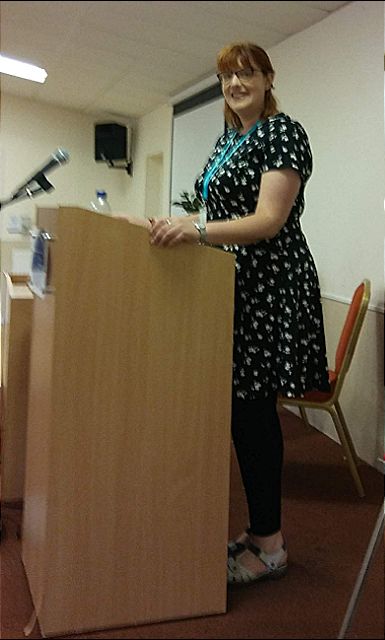Image Credit: Unless stated otherwise, all photos were taken by Allison Symes
I’ve recently returned from my annual trip to the Swanwick Writers’ Summer School, which is based at The Hayes Conference Centre in Swanwick, Derbyshire. I had a fantastic time learning from the courses and workshops, meeting up with old friends and making new ones.

My Swanwick this year started at Derby Railway Station when meeting friends while waiting for the coach to take us to The Hayes. If you ever wondered can writers run out of things to say about writing, I’ll enlighten you now – the answer to that is no!
Feed Your Mind
Writing stretches you. You need material to draw on to be able to write anything and that will be influenced by what you read, who you meet, your life experiences and so on.
Feed the mind well, ensure there is plenty of material in there for you to work with (and it doesn’t have to be autobiographical. Meeting an eccentric character in a supermarket, say, could inspire different types of story. I suspect many of us will have met such a character. I try my best to ensure said eccentric character isn’t me incidentally!).
If you want to keep writing, you must keep feeding your mind. You need ways of coming up with new story and article ideas. You need to enjoy the process of writing and editing (why else put yourself through it otherwise, especially as there’s no guarantee of publication via traditional means for anyone?).
Challenges change over time too. The first one is to simply write a story. You want to prove to yourself you can do it. Later, there will be the challenge to be published. Then there will be the ongoing one to see if you can keep on being published. Maybe then it will be time to try writing a book or in a different genre.
Even if you decide the only thing you want to write is crime stories, say, won’t you want to see if you can write a short story/novella/novel in that genre? And then comes the challenge of finding the right markets.
So what is so great about Swanwick?
Hmm… where do I start?
Firstly, you are in a place with around 300 others who understand the compulsion to write. There is no need to explain anything. Nor do we ask each other where we get our ideas from! I could write a separate post as to why writers to a T dislike that question as there is no simple answer. Ideas come from all over the place. The tricky bit is working out which ones will be the “goers”.
Secondly, you also get to be a writer 24/7 which sounds odd. Am I not a writer 24/7 at home? Well, yes, but other things (life) happen and can restrict writing time. For six glorious days, that doesn’t happen at Swanwick.
I’m realistic enough to realise, even if somehow Swanwick could last for ever, it wouldn’t be a good thing. Why? Because you need to come home and work on those ideas triggered by that splendid course you did. You need to write around your other commitments and learn to use the time you do have to write as well as you can. The real commitment to writing comes when, despite all other pressures, you write anyway.
What Swanwick gives you is the encouragement to keep going and courses and workshops which will help you on the direction you’ve taken. It can also take you into exploring areas of writing you hadn’t considered. (I take the view nothing ventured, nothing gained. It was that attitude which led me to try flash fiction. No regrets there!).
The Writing Life
Then there are the after dinner speakers who cover so many areas in writing. I was engrossed this year with the stories of the writing life from a very funny children’s writer. That sort of thing can (a) warn you about what can happen to the unsuspecting writer and (b) show you the writing life is not all a bed of roses. It pays to be reminded of that.
Few writers ever feel they’ve “made” it. There are always things we want to still write, improve on etc., and I think that’s a good thing. It means you don’t take anything for granted. You need a certain amount of ego/self-belief to keep going but have too much and you’ll be a pain to those around you.
I see going to Swanwick as my Continuing Professional Development. I have no idea where I’ll end up with my writing (and the fun is in finding out! Incidentally I know where I’d like to be but I can’t know if I’ll succeed. I can but give it my best shot). What I do know is I need inspiration and encouragement for when I’m back home again dealing with the nitty-gritty. We write on our own. To be together with like-minded people for a while is fabulous.
Contacts
Contacts are made too. One of the joys of social media is being able to keep those contacts going for the rest of the year. (And it is lovely meeting people at Swanwick whom previously I’ve only “met” on Facebook or Twitter).
Contacts are vital for a writer. I’ve heard of competitions and markets that way. I share news of what I know with others. The writing community is generally supportive because most of us know we are not in competition with each other, even when writing in the same genre. We also know how tough it can be and how rotten it feels when all that comes in are rejections (or you don’t hear from a competition or market and that in itself is usually a rejection).
I can only write in my voice and not in someone else’s. Yes, I could copy that but it would be, to me, a pastiche. I think that would come across to readers as such. There is a place for spoofs (Bored of the Rings, anyone?) but it is not my style. I want to write what I can write in the way I write things. I don’t want to ape anyone else. The whole point is to be creative and that means drawing on your life and what you know and are inspired by.
I’ve been told by Jennifer C Wilson of the Kindred Spirits series Swanwick is like fresher’s week. I never went to university so can’t comment but I do know the support and encouragement from fellow writers will be of enormous help to me during the next 12 months. I hope the support and encouragement I give will help others. What goes around etc etc. (It is amazing how often that happens in the writing world).
The challenge with Swanwick is working out what courses you want to do. There is a wealth of choice. The nice thing is if you pick a specialist course and you decide it’s not for you, there’s nothing to stop you switching to another. Some people deliberately try one session of each of the courses to get a taster of them. There are a range of shorter courses and one hour workshops too. Neither do you have to do everything. You can do as much or as little as you want.
Newbies to Swanwick are given a particularly warm welcome and what is lovely is coming across first timers here who, within a day or so, look as if they’d been coming to the School for years.
That is always a good sign. I knew within hours of going to my first Swanwick, I wanted to be back for the next.

Writers who don’t develop run the risk of becoming bored with what they write (and inevitably run the risk of stopping altogether). I’d urge any writer who knows they are in this for the long haul to look at how to develop their craft. In getting together with other writers, you can have a lot of fun as you do that! Nobody says you have to develop your craft on your own and I am so glad of that!
Related Posts:-
Ghosts, History and What Might Have Been: Introducing Jennifer C Wilson
Stepping Back in Time: Part 2 of Jennifer C Wilson Interview
Read interviews with Chandler’s Ford writer Allison Symes: Part 1 and Part 2.
Read blog posts by Allison Symes published on Chandler’s Ford Today.
Never miss out on another blog post. Subscribe here:






What a great summary. You represent what at least 250 of the writers at Swanwick would say. For me, it is always the best week of my year.
Many thanks, Lance. Swanwick is the highlight of my writing year too. See you hopefully next August!
Ah, how your feature brings back all the joy of Swanwick! You describe it all very well.
Many thanks, Veronica.